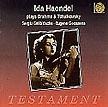Ida Haendel by Alan Horgan
/ November 1, 1997
 I once skipped a Metropolitan Opera performance of
Verdi's Ernani (unthinkable!) to hear violinist Ida Haendel
with the Toronto Symphony. This was a wise move. She gave an
absolutely jaw-dropping performance of her signature piece, the
Sibelius Violin Concerto. After a radio
broadcast of the work many years ago, the composer himself wrote her
a congratulatory letter which she has used ever since to terrorize
substandard conductors. I once skipped a Metropolitan Opera performance of
Verdi's Ernani (unthinkable!) to hear violinist Ida Haendel
with the Toronto Symphony. This was a wise move. She gave an
absolutely jaw-dropping performance of her signature piece, the
Sibelius Violin Concerto. After a radio
broadcast of the work many years ago, the composer himself wrote her
a congratulatory letter which she has used ever since to terrorize
substandard conductors.
Coming in the immediate post-Heifetz generation,
Haendel's approximate contemporaries were Menuhin, Ricci, Szeryng,
and Stern. There is some dispute about her actual age. According to
the Grove Dictionary of Music and Musicians, she was born in Poland in 1924. Her talent
was recognised early on and her family moved from Chelm to Warsaw to
facilitate her studies. After winning the Hubermann Prize at the age
of ten, she was granted a scholarship to study with Szigetti in
Paris. It didn't pan out, so she ended up with the great Carl
Flesch. She also took some lessons from the Romanian violinist and
composer Georges Enescu.
Ida Haendel made her London debut in 1936. In
1939 she settled there, having narrowly escaped Poland ahead of the
German invasion. In 1952 she moved to Montreal. When Franz-Paul
Decker took over the directorship of the Montreal Symphony from
Zubin Mehta, he was absolutely thunderstruck to learn that she had
never been invited to play with the orchestra. This was hastily
rectified. Since the death of her father, she is no longer a
Montreal resident, dividing her time between homes in London and
Miami. An autobiography, Woman with Violin, appeared in 1970 and she is now said to be at work on
another volume.
Though she is admired by composers and
performers alike, Ida Haendel's name is not a household word. Who
cares? She is a fiddler's fiddler. Music, not PR, comes first. A
true musical aristocrat, it is impossible to imagine her making
guest appearances with the Muppets (are you listening, Itzhak
Perlman?). She gives strong, forthright, unsentimental accounts of the great works
she has been playing in public for over 65 years. This absence of
emotional self-indulgence has caused some critics to accuse her of
coldness, but this is missing the point altogether.
Two important reissues of Haendel's older EMI
recordings are available on the Testament label. The earliest
(Testament SBT 1083) features the Bruch Concerto No. 1 in G
minor and the Beethoven Concerto (with the Joachim cadenzas).
The Bruch was recorded in 1948 and the Beethoven in 1949. Rafael
Kubelik conducted the Philharmonia Orchestra, then only three years
old, and the producer was the legendary Walter Legge. As they were
originally 78s, there were no retakes or splices. It is honest work
and I do not find the minor imperfections troublesome. There was a
problem of pitch distortion on the master tapes, impossible to
eradicate and duly noted in the excellent liner notes.
Interpretively, Haendel does not wallow in emotionalism. It's all
there on the page and she gives it straight, or at least relatively
so. As a student of the great Carl Flesch, she does bring some of
the old school to her contribution, taking some license transposing
certain passages up an octave, and so forth. Haendel sanctioned the
re-release of the material while emphasizing that the
interpretations are representative of her forty years ago, not
today.
The second disc (Testament 1038), recorded
in 1953, features the Brahms concerto with Sergiu Celibidache
conducting the London Symphony and the Tchaikovsky concerto with Sir
Eugene Goossens conducting the Royal Philharmonic. This is a rare
opportunity to hear these two great conductors, especially the
enigmatic Celibidache who steadfastly refused to make commercial
recordings for forty years thereafter. According to the booklet he
said that "listening to a record is like going to bed with a picture
of Brigitte Bardot." He used to insist on enormous amounts of
preparation time and drove orchestral musicians insane by making
them play scales in rehearsal.
Neither of these fine CDs will please everyone.
Haendel's slightly steely tone is faithfully captured, but those
listeners desiring lush and sensuous sound will be disappointed. The
orchestras are so very
English. The acid tone of the oboes gives it away every time. It's
the sort of sound with which you could curdle milk at a hundred
yards. The packaging on both releases includes interesting period
photos and the notes are a treasure trove of juicy biographical
information.
Ida Haendel will be
joined in recital by pianist Jonathan Feldman at Théâtre Maisonneuve
on Monday December 1 at 8 p.m. The concert, sponsored by Pro Musica,
includes the Chaconne from the Bach Partita No. 2, the Brahms Sonata
No. 3 in D minor, and the Enescu Sonata No. 3. For more information
call 845-0532. |
|


